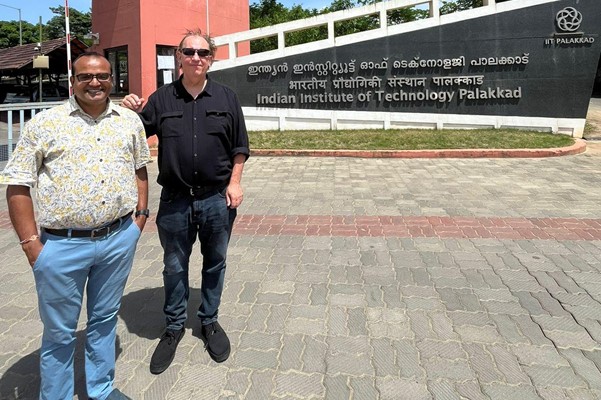Professors Paul Chaney (Cardiff University) and Sarbeswar Sahoo (IIT Delhi) (pictured), in association with Dr Reenu Punnoose (IIT Palakkad) and Dr Haneefa Muhammed have been conducting fieldwork examining civil society perspectives on the contemporary citizenship rights of indigenous people in south India. This is part of research funded by the Academy of Medical Sciences.
By way of context, according to the Indian Constitution, 705 ethnic groups are identified as Scheduled Tribes (STs) – or “Adivasis”/ indigenous peoples. Many are to be found in seven states of northeast India and the central tribal belt (ranging from Rajasthan to West Bengal). Here they make up 8.6% of the population, approximately 104 million people.
As part of our new WISERD research, a recent workshop was conducted in Kerala. It was attended by many members of the Irula People. The population of the Irulas is approx. 200,000. As Harish (2023) has aptly noted: the Irulas are ‘stigmatized for their [perceived] poor social and economic standards’. Our study found that the Irula have a rich and vibrant culture, proud identity and expressive Dravidian languages. In particular, our research participants spoke passionately about the contemporary challenges they face.
One of the key messages they shared was the threat to the Irula languages. This was a major concern to them. It is an issue that has historical roots. Following independence from the UK, the administrative map of India was redrawn and in 1956, as elsewhere in the country, local languages shaped the emergence of the new states’ boundaries – in this case – of Kerala (largely Malayalam speaking) and Tamil Nadu (largely Tamil speaking). The Irulas – as well as the Kurumbas who lived in the bordering regions of Kerala and Tamil Nadu, became divided. The Kurumbas and a majority of Irulas now live in the border regions of Tamil Nadu.
Our workshop participants said that while the Irulas of Kerala are similar socio-economically and culturally to the Irulas and Kurumbas of Tamil Nadu, it is only in Tamil Nadu that the Irulas and Kurumbas are classified by the Indian Government as ‘Particularly Vulnerable Tribal Groups’ (PVTGs). Our workshop participants pointed out that because of this recognition, the Irulas of Tamil Nadu have access to various government benefits and development funds, but they do not. This shows how the linguistic reorganisation of state boundaries has deprived the Irulas of Kerala in the post-independence governance structure.
They also spoke of a general failure of state governments to provide education in the Irula languages and alluded to discrimination and stigmatization faced by today’s Irula school children. They explained how many try to conceal their Irula identity. As a coping tactic, they adopt assumed, non-Irula, Malayalam names in school – in order to “pass”. To achieve this, they avoid speaking Irula languages in public.
Our research participants spoke of how children were educated in the dominant Malayalam language, and the confusion this caused (there are shared words – often same spellings and/or pronunciation – in the Irula and Malayalam languages – yet they have completely different meanings). Participants also condemned the lack of textbooks and teaching resources in the Irula tongues.
As Harish (2023) proceeds to note, the Irula ‘play a vital role in conserving nature… Without preserving these indigenous people, it is impossible to conserve nature’ Workshop participants confirmed this. They spoke with horror of the ongoing destruction and degradation of the environment in their homelands, much of this is at the hands of in-migrants – indeed realtors’ sales pitch, evident in roadside hoardings, invites prospective urban Indian buyers to purchase an affordable residence in this rural paradise. Many have done so with scant regard to the environment – and, unless state policy changes, many others will follow. Again, this problem has historical roots. Colonisation under the British saw rapid deforestation. It was industrialised exploitation; a railway was constructed to export the timber to the rest of the world. Trees are sacred to the Irula. They do not fell them.
Intergenerational differences emerged as a resounding and worrying issue in the workshop. Fears were expressed that, in the face of ongoing discrimination and cultural oppression, notably in the education system, as well as – globalisation and the homogenising effects of social media and consumer consumption – younger Irulas may be less active than previous generations in maintaining tribal culture and identity.
Overall, our emerging research findings reveal the diverse ways in which the Irula peoples continue to face rights violations and oppression. This stems from inadequate monitoring and enforcement of the law, power disparities in governance structures that privilege central and state governments at the expense of indigenous communities, and fundamental conflicts between indigenous interests and neo-liberal capitalism and extractive industries.

